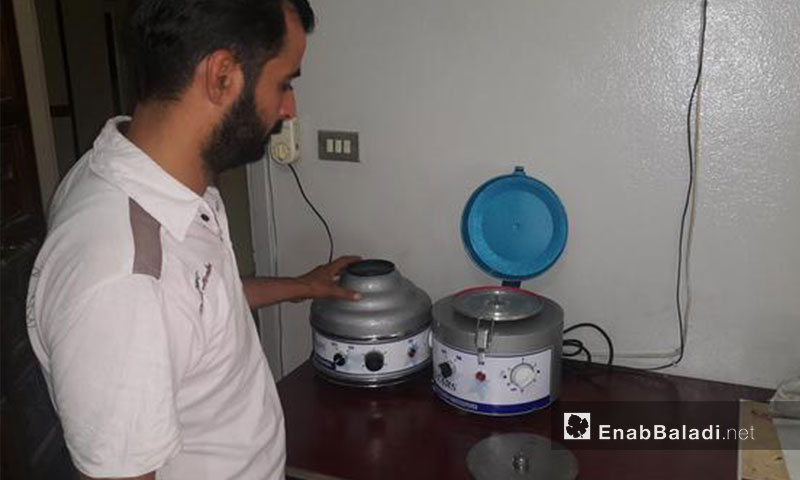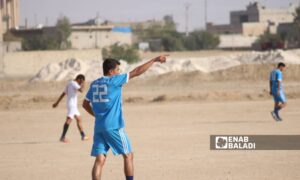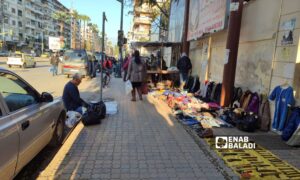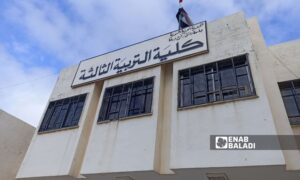
Laboratory Technician Manufactures Medical Blood Centrifuge Machines in Ghouta

For more than a year and a half, the medical analyses laboratory technician Khalid Abu Al-Walid worked on manufacturing blood centrifuges manually. This device, upon which disease diagnosis depends, separates the solid components of blood from plasma.
After working on different models and manufacturing tens of pieces and parts, most of which were destroyed, Khalid was able to manufacture “a large tubes and a small tubes centrifuge (hematocrit), which is the ratio of the volume of red blood cells to the total volume of blood,” the basis of medical laboratories work.
The device separates elements of blood cells from the floating fluid (plasma) and is crucial for obtaining the “substrate” in urinary analyses. The substrate is separated by the centrifuge and its contents are used to diagnose diseases.
As an alternative to prefabricated foreign devices, Khalid relied on locally manufactured pieces since the beginning of his work and on the development of components and structures. In early 2016, he told Enab Baladi: “I started working on solving small problems, relying on one of the imported disabled devices in Ghouta, which I dismantled and discovered its mechanism of action.”
Being aware of the technical specifications of the “blood centrifuge” device, the laboratory technician made his best to match the components of the device with these specific conditions, notably the speed of rotation as well as the compatibility of the pieces and their weights within the outer structure.
While most of the blood centrifuges in Ghouta were used during the siege, others were at the end of their service life expectancy, according to the laboratory technician, who relied on electricians and lathe owners to manufacture the components of the device.
After making three models, the work was successful, according to Khalid. He explained that “the device is sensitive because it rotates thousands of times per minute and can break or cause damage to those who use it.”
With available resources, the absence of the metal used in industry and the lack of plastic that used to be brought from Ghouta, precisely from the industrial area of Housh Blass near Damascus, Khalid worked until the results met those given by the original “centrifuges,” as he described.
Khalid stated: “I have finished manufacturing and assembling four devices out of ten in the project, which need only to be assembled.” He explained the reason for announcing his project at the end of July 2017 and attributed it to “the limited material resources, because at first the project was individual and after I suggested it to many, they refused to cooperate since it might be a huge failure.”
The laboratory technician at the Unified Medical Office in Ghouta, Mohammed Khair Badran, is impressed by the idea of recycling the available devices in order to manufacture others.
“I cannot judge it before I see it,” said Mohammed, considering that evaluating a newly manufactured device would take some time. He explained that “at least 60 patients are admitted to the laboratory every day and so the ability of the devices to work for more than 20 times in a row must be tested.”
Centrifuges prices vary in Damascus as the cost of Japanese Hitachi is between 400 and 1500 dollars. Although the quality of the hand-made device is not similar to the other, it costs less than 150 to 200 dollars, according to Khalid.
Before the closure of the tunnels, following the regime’s seizure of Qaboun last May, the cost of device delivery to Ghouta was 700 dollars, including the transportation cost, let alone “the difficulty of purchasing it after the regime imposed the determination of the medical authority which will receive it,” said Khalid.
“It is enough for me that I was able to reach the stage of success and broke the overwhelming concern that has always accompanied me in the laboratory. We manufactured the pieces in Ghouta, so maintenance will be very easy,” Khalid concluded.
Khalid wishes his devices to be distributed to laboratories. He stated that “in case one person remains as the only contributor in the project he will certainly be exhausted,” and pointed out that “the device is not very expensive and I hope it will be distributed, because many people do not know me but I believe in its necessity.”
if you think the article contain wrong information or you have additional details Send Correction
النسخة العربية من المقال
-
Follow us :
Most viewed
- Saudi Arabia to prosecute sheikh Saleh al-Shami and ten Syrians in May
- Hidden aspects of Iranian consulate building targeted in Damascus
- Liwa al-Quds mourns 22 members following attack on military bus in Homs countryside
- Israeli strikes target military airports in southern Syria
- Samir Geagea: 40% of Syrians in Lebanon are "illegal refugees"

















 A
A
A
A
A
A








 More Society
More Society